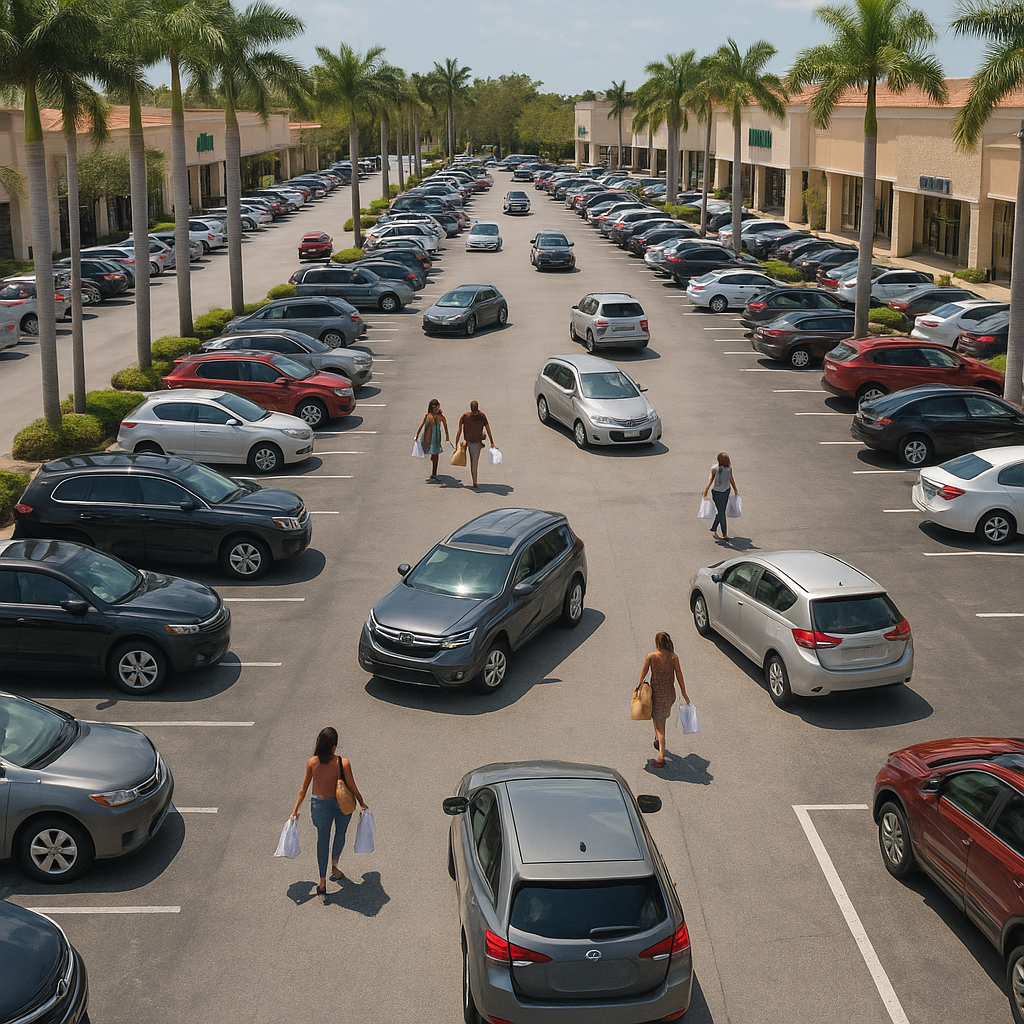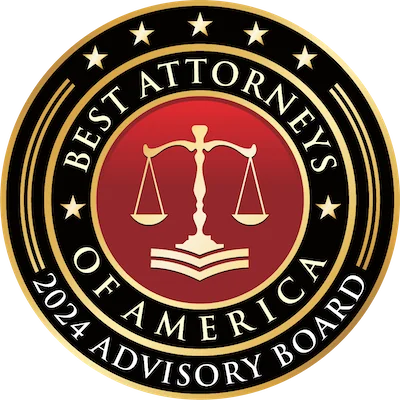Parking lot accidents represent one of the most common yet misunderstood types of vehicle collisions. Many drivers assume these “minor” incidents don’t require legal attention, but understanding parking lot accident liability in Florida can mean the difference between recovering fair compensation and bearing unnecessary costs yourself. As Black Friday and holiday shopping season approaches, crowded parking lots at South Florida malls and shopping centers become accident hotspots where frustrated shoppers and rushed drivers create dangerous conditions.
As car accident attorneys, we’ve handled numerous parking lot accident cases throughout our 30+ years serving Boca Raton, Wellington, Delray Beach, and surrounding communities. These cases often involve unique challenges related to private property rules, disputed fault, and inadequate evidence that require experienced legal representation.
Why Parking Lot Accidents Are So Common
Parking lot collisions occur with surprising frequency, particularly during November and December when holiday shopping drives increased traffic to retail centers throughout Palm Beach and Broward Counties.
Black Friday and Holiday Shopping Surge:
The period between Thanksgiving and New Year’s sees dramatic increases in parking lot accidents as shoppers flood popular destinations like Boca Raton Town Center, Wellington Green Mall, and Delray Marketplace. Crowded conditions, limited available spaces, and time-pressured shoppers create perfect conditions for collisions. Pedestrian activity increases significantly as families with children navigate between stores, further complicating traffic flow.
Common Contributing Factors:
Limited visibility around large SUVs and trucks makes it difficult for drivers to see vehicles or pedestrians approaching from adjacent aisles. Confusing traffic flow patterns in poorly designed parking lots leave drivers uncertain about right-of-way. Distracted drivers searching for parking spaces, checking phones, or managing children often fail to notice other vehicles or pedestrians. Backing accidents occur when drivers reverse from spaces without adequate sight lines to see approaching traffic.
Common Types of Parking Lot Accidents
Understanding the most frequent parking lot collision scenarios helps drivers recognize risks and establish liability when accidents occur.
Vehicle-to-Vehicle Collisions:
Two cars backing out of adjacent spaces simultaneously represent one of the most common parking lot accidents. These typically result in shared liability since both drivers failed to yield appropriately. One vehicle backing from a space into a car driving through the parking lot lane usually places fault on the backing driver, who has a duty to ensure the path is clear before reversing.
Collisions at parking lot intersections where lanes cross follow similar right-of-way rules as public roads. Door-opening accidents occur when parked vehicle occupants open doors into passing traffic, creating liability questions about who bears responsibility.
Pedestrian Accidents:
Shoppers struck while walking to or from stores represent serious parking lot accidents with potentially severe injuries. Children running between parked cars create particularly dangerous situations where visibility limitations prevent drivers from seeing pedestrians until too late. Crosswalk accidents in designated pedestrian lanes within parking lots typically favor pedestrian right-of-way, though circumstances may affect liability distribution.
Property Damage Incidents:
Runaway shopping carts striking parked vehicles raise questions about store liability for maintaining cart corrals and preventing carts from rolling freely. Minor property damage from tight parking spaces or careless door openings may seem trivial, but can result in expensive repair costs.
Florida Parking Lot Liability Laws
Who is at fault in a parking lot accident in Florida?
Determining liability in parking lot accidents involves understanding how Florida law applies traffic rules to private property and when property owners bear responsibility for dangerous conditions.
Private Property Complications:
Parking lots exist on private property, which creates some differences from public roadway accidents. However, Florida traffic laws generally apply in parking lots open to public use, meaning standard right-of-way rules, speed limits, and duty of care requirements still govern driver behavior. Courts recognize that drivers must exercise reasonable care in parking lots just as they would on public streets.
Common Fault Scenarios:
When two vehicles back out simultaneously, Florida’s comparative negligence system typically assigns shared fault unless evidence shows one driver began backing first or one driver had a clear opportunity to avoid the collision. Backing drivers bear greater responsibility because they must ensure their path is clear before reversing into traffic lanes.
Through lane traffic generally has right-of-way over vehicles entering or exiting parking spaces. Pedestrians in designated crosswalks or walking in parking lot lanes typically have right-of-way over vehicles, though pedestrians must also exercise reasonable care for their safety.
Florida’s Comparative Negligence System:
Florida follows a modified comparative negligence rule where injured parties can recover compensation if they bear 50% or less of the fault. Your compensation is reduced by your percentage of fault, so a driver found 30% responsible would recover 70% of their total damages. This system requires careful evidence gathering to accurately establish each party’s contribution to the accident.
Property Owner Liability:
Shopping centers and retail property owners can face liability when dangerous parking lot conditions contribute to accidents. Poor lighting that prevents drivers from seeing pedestrians or other vehicles, inadequate signage creating confusion about traffic flow, potholes or surface defects causing drivers to lose control, and missing traffic control devices at busy intersections all create potential premises liability claims.
Determining Fault in Parking Lot Accidents
Establishing who caused a parking lot accident requires thorough investigation and evidence collection, particularly since police may not always respond to minor parking lot collisions.
Critical Evidence:
Security camera footage from stores or parking lot surveillance systems provides objective evidence of how the accident occurred. Many shopping centers maintain extensive camera coverage that can clearly show vehicle movements and establish fault. Request this footage immediately, as many systems overwrite recordings after a short period.
Witness statements from other shoppers who observed the collision help corroborate your version of events. Photographs of vehicle damage, final positioning, parking lot layout, and relevant signage document conditions at the scene. Skid marks, debris fields, and impact points help accident reconstruction experts analyze the collision if disputes arise.
What to Do After a Parking Lot Accident
Should I call police for a parking lot fender bender?
Taking proper action after a parking lot accident protects your legal rights and creates documentation necessary for insurance claims.
Always Call Police:
Even seemingly minor parking lot accidents warrant police reports that create official documentation of the incident. Injuries may not manifest symptoms immediately, and having a police report strengthens insurance claims when injury treatment becomes necessary days later. Some insurance policies require police reports for coverage, making this step essential.
Document Everything:
Photograph all vehicles involved from multiple angles, showing damage, license plates, and final positions. Capture the parking lot layout including lane markings, signage, lighting conditions, and any visibility obstructions. Note whether security cameras are present and request footage preservation from property management immediately.
Exchange driver’s license numbers, insurance information, and contact details with all involved parties. Avoid admitting fault or apologizing, as statements made at the scene can be used against you later during insurance negotiations.
Seek Medical Evaluation:
Visit a doctor promptly even for apparently minor accidents. Whiplash, soft tissue injuries, and other collision-related harm may not cause immediate pain but can develop into serious conditions requiring extensive treatment. Medical documentation from soon after the accident establishes causation between the collision and your injuries.
When to Contact a Florida Parking Lot Accident Lawyer
While some parking lot accidents involve only minor property damage that insurance handles smoothly, several situations warrant legal consultation.
Disputed Liability:
When the other driver denies fault or their insurance company refuses to accept responsibility, experienced legal representation becomes essential. Insurance adjusters may attempt to blame you for accidents where evidence supports the other driver’s fault.
Significant Injuries:
Parking lot accidents can cause serious injuries, including whiplash, back injuries, traumatic brain injuries from head impacts, and broken bones. Medical expenses, lost wages, and pain and suffering compensation require professional legal advocacy to ensure fair settlement values.
Property Owner Negligence:
When dangerous parking lot conditions contributed to your accident, pursuing premises liability claims against property owners adds complexity, requiring legal expertise. These cases involve different legal standards than simple driver negligence claims.
How Silver Injury Law Handles Parking Lot Accident Cases
Our three decades of experience throughout South Florida give us unique insight into local shopping centers, common accident locations, and effective case strategies. We immediately preserve security footage, interview witnesses, and document scene conditions before evidence disappears.
We work with accident reconstruction experts when necessary to establish fault in disputed cases. Our knowledge of Florida’s comparative negligence system helps us fight unfair fault allocation that reduces your compensation. We handle all negotiations with insurance companies and opposing counsel, protecting you from tactics designed to minimize payouts.
Silver Injury Law operates on a contingency fee basis for parking lot accident cases, meaning you pay no upfront costs or attorney fees. We only get paid when we successfully recover compensation for your injuries and damages.
Frequently Asked Questions
Do I need a police report for a parking lot accident? Yes, police reports provide crucial documentation even for minor collisions. Many insurance companies require reports for claims.
What if the other driver left without exchanging information? This constitutes hit-and-run. Your uninsured motorist coverage may provide compensation. Report it to police immediately.
Can I sue the shopping center for a parking lot accident? Yes, if dangerous property conditions contributed to the collision. Property owners must maintain reasonably safe premises.
How long do I have to file a parking lot accident claim? Four years for personal injury claims, though prompt action preserves evidence and strengthens your case.
Protecting Your Rights After Parking Lot Accidents
As November brings increased shopping activity leading up to Black Friday and the holiday season, parking lot accident risks increase throughout South Florida. Understanding your legal rights and taking proper action after collisions ensures you receive fair compensation for injuries and property damage.
If you’ve been involved in a parking lot accident in Boca Raton, Wellington, Delray Beach, or surrounding Palm Beach County areas, contact Silver Injury Law for a free consultation. Our experienced team understands parking lot accident liability and fights for maximum compensation.




